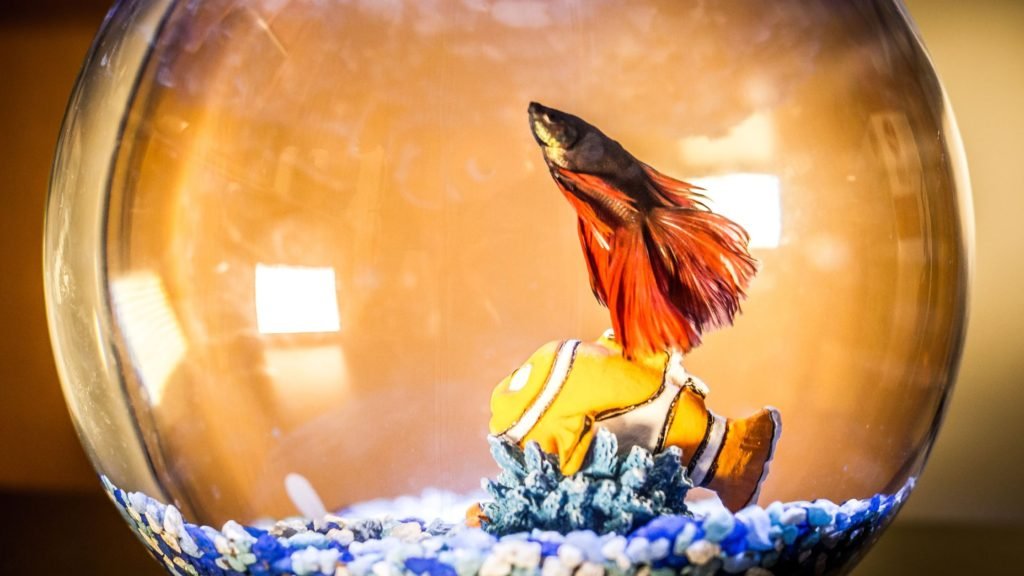Have you ever wondered the best way to clean a betta fish tank? Proper tank maintenance is vital to keeping your betta fish healthy and happy. Follow these tips for a clean and vibrant tank. Learn how to maintain a healthy betta fish tank, feed them properly, and provide good care.
Why Betta Fish Tank Maintenance is Important
Keeping a clean and well-maintained betta fish tank is crucial for several reasons:
- It ensures that your betta fish live in a healthy environment, free from harmful bacteria and toxins.
- It helps maintain water quality, essential for your fish’s overall health.
- A clean tank reduces the likelihood of diseases and other health issues, ensuring your betta fish live a long and happy life.
The Importance of Water Quality
Water quality plays a vital role in the health of your betta fish. Poor water quality can lead to various health problems, including stress, disease, and even death. Keeping the tank clean and performing regular water changes is essential to maintain good water quality.
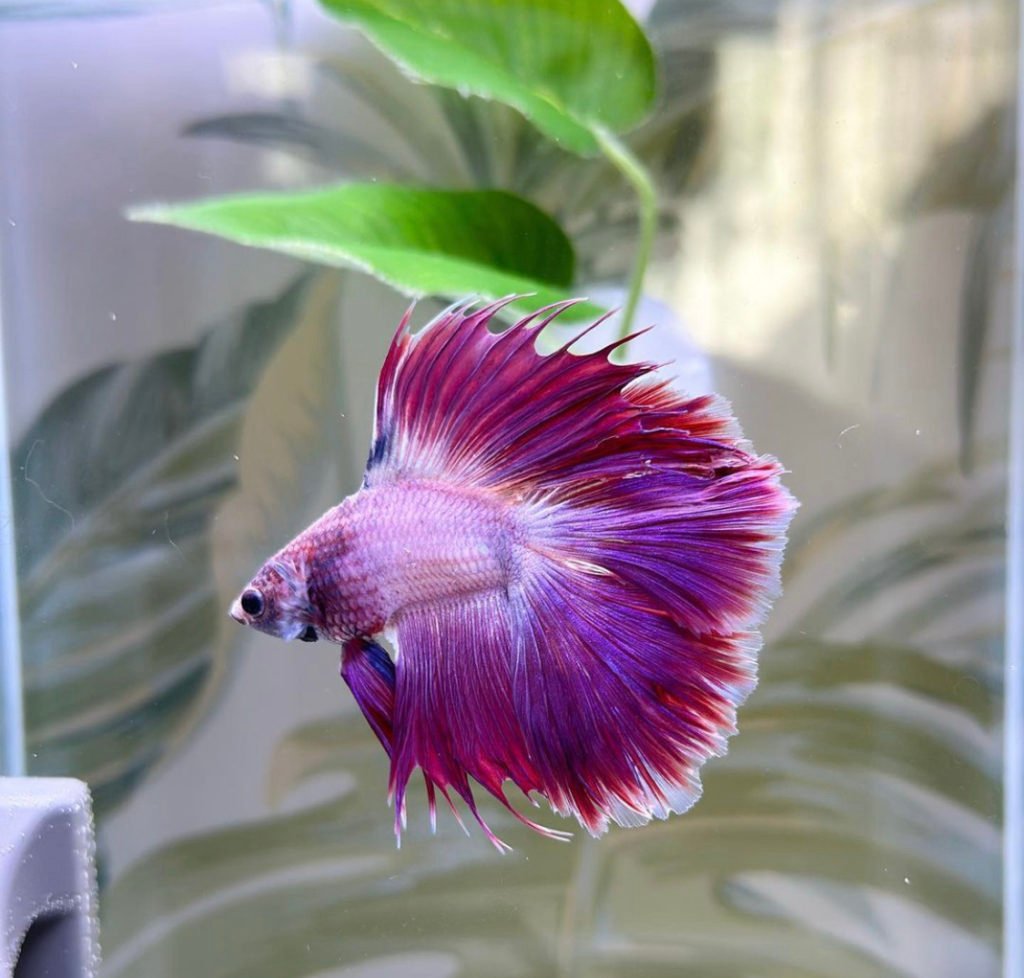
Betta Fish Tank Maintenance Tips
Now that we understand the importance of a clean betta fish tank let’s explore some practical maintenance tips to ensure your betta fish live in the best possible environment.
Perform Regular Water Changes
One of the most crucial aspects of betta fish tank maintenance is regular water changes. Experts recommend changing 25-50% of the water in your betta fish tank every 1-2 weeks, depending on the tank size and the number of fish. That helps maintain optimal water quality by removing harmful waste and toxins accumulated over time.
Clean the Tank and Decorations
In addition to water changes, cleaning the tank and any decorations inside is essential. That helps remove algae, bacteria, and debris that can build up on the tank walls and decorations. Use a clean sponge or soft brush specifically designed for aquarium use to gently scrub the tank’s surfaces, being careful not to scratch the glass or acrylic. Also, rinse any decorations in warm water to remove algae or debris.
Maintain the Filter
The filter is crucial in keeping your betta fish tank clean by removing waste, debris, and harmful chemicals from the water. To maintain optimal filter performance, clean or replace the filter media regularly, as the manufacturer recommends. That will ensure the filter continues to function effectively, maintaining good water quality for your betta fish.
Monitor Water Parameters
Regularly testing the water in your betta fish tank is essential to ensure that water parameters, such as pH, ammonia, nitrite, and nitrate levels, are within the acceptable range for betta fish. You can use a water test kit to monitor these parameters and make necessary adjustments to maintain optimal water quality.
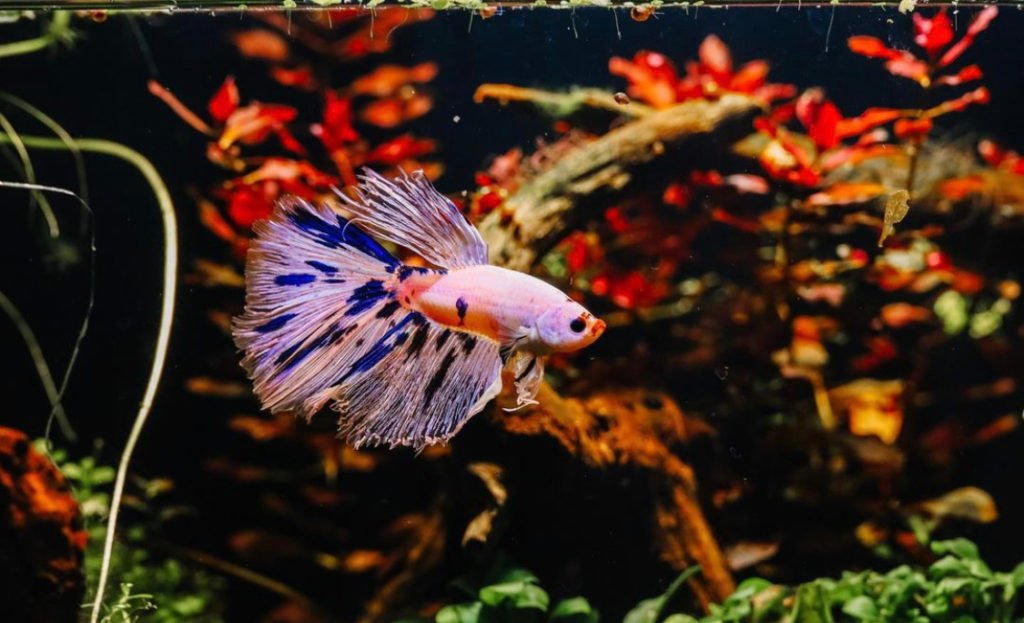
Betta Fish Feeding Tips
Proper nutrition is essential for the health and well-being of your betta fish. Here are some feeding tips to ensure your betta fish receive a balanced and varied diet.
Feed a High-Quality Betta Fish Food
When it comes to feeding your betta fish, choose a high-quality betta fish food specifically designed to meet their nutritional requirements. These foods typically contain proteins, fats, vitamins, and minerals essential for betta fish health.
Offer a Varied Diet
While betta fish food should make up most of your fish’s diet,
offering a varied diet is essential to ensure they receive all the necessary nutrients is vital. In addition to betta fish food, you can provide live or frozen foods such as brine shrimp, daphnia, and bloodworms as treats. These foods can help improve your betta fish’s overall health, color, and vitality.
Avoid Overfeeding
Overfeeding your betta fish can lead to obesity, poor water quality, and other health issues. To prevent overfeeding, offer your betta fish small, frequent meals throughout the day rather than one large meal. A general rule of thumb is to feed an amount that your betta fish can consume within 2-3 minutes.
Betta Fish Care Tips
In addition to proper tank maintenance and feeding, there are some general betta fish care tips to ensure your fish thrive in their environment.
Provide a Suitable Tank Size
Betta fish require ample space to swim and explore their environment. A minimum tank size of 2.5 gallons is recommended, but a larger tank of 5-10 gallons is even better. A larger tank will provide more swimming space, help maintain better water quality, and reduce stress on your betta fish.
Maintain a Stable Water Temperature
Betta fish are tropical and require a stable water temperature between 76-82°F (24-28°C). To maintain this temperature range, invest in a reliable aquarium heater and thermometer to monitor the water temperature regularly.
Provide Hiding Spots and Enrichment
Betta fish enjoy having places to hide and explore in their tank. Providing decorations, plants, and caves can offer them security and help reduce stress. Live plants, such as Java fern and Anubias, are excellent choices, as they can also help improve water quality and provide additional hiding spots for your betta fish.
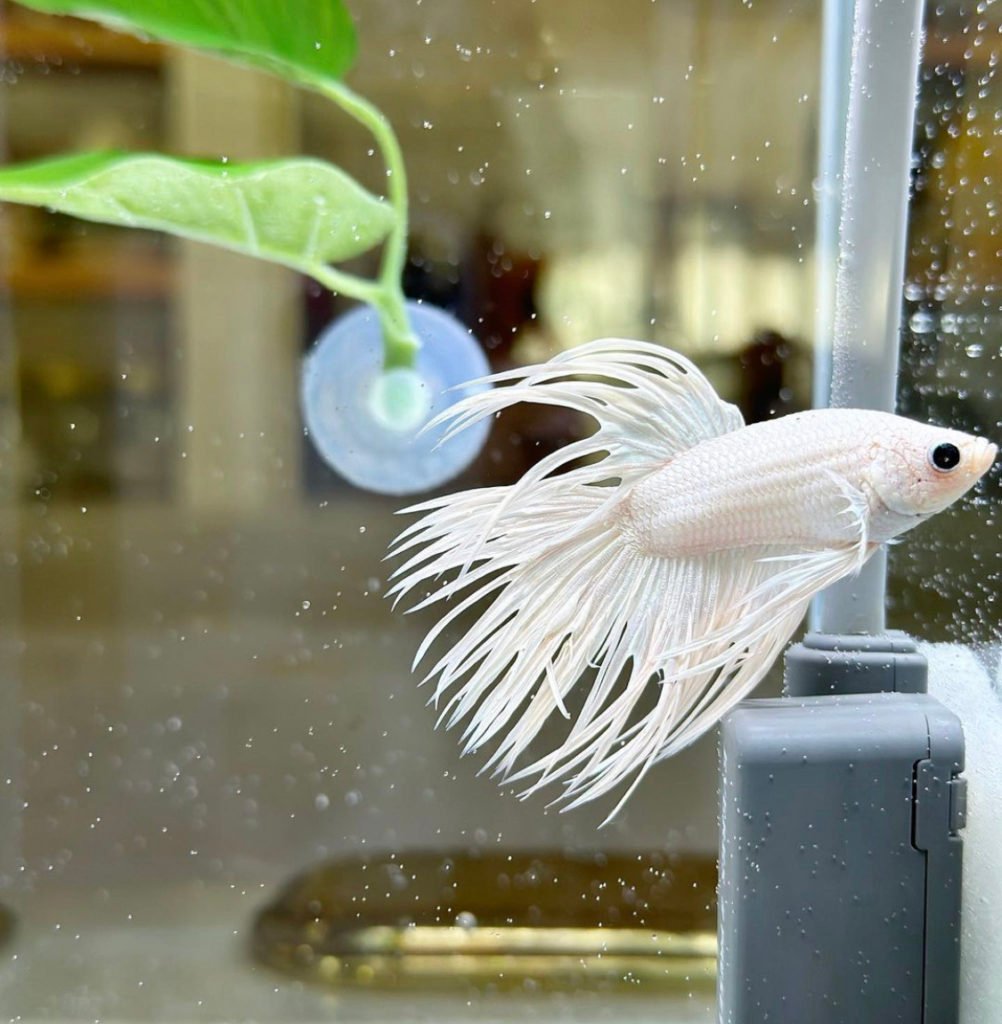
Betta Fish Tank Decorations and Enrichment
Decorating your betta fish tank can be an enjoyable aspect of pet ownership. By providing a stimulating environment, you can help keep your betta fish healthy and happy. When choosing decorations, consider the following:
- Live plants: Live plants can benefit betta fish tanks as they help maintain water quality by absorbing excess nutrients. Suitable plant options include Java moss, Java fern, and Anubias.
- Caves and hiding spots: Betta fish appreciate having places to hide and rest. You can purchase commercial decorations or use terracotta pots or PVC pipe to create hiding spots. Make sure that there are no sharp edges that could injure your fish.
- Driftwood: Adding driftwood to your betta fish tank can provide a natural look and offer additional hiding spots. Ensure the driftwood is adequately cleaned and prepared before adding it to the tank to avoid introducing harmful substances.
- Smooth stones and pebbles: Smooth rocks and gravel can create a natural-looking substrate for your betta fish tank. Be sure to clean and rinse them thoroughly before adding them to the tank.
Monitoring and Maintaining Water Parameters
Maintaining optimal water parameters is crucial for the health of your betta fish. Regularly testing the water will help you detect any issues before they become serious problems. Some key parameters to monitor include:
- Temperature: Betta fish thrive in water temperatures between 76 and 82°F (24 and 28°C). Use a heater to maintain a stable temperature and a thermometer to monitor it.
- pH: Betta fish prefer slightly acidic to neutral water, with a pH between 6.5 and 7.5. You can use pH test kits to monitor the pH levels and make adjustments as necessary.
- Ammonia, nitrite, and nitrate: These compounds can harm your betta fish if they are present in high concentrations. Ammonia and nitrite should be kept as close to 0 ppm (parts per million) as possible, while nitrate levels should be below 20 ppm. Regular water changes and proper filtration can help maintain these parameters within safe ranges.
- Water hardness: Betta fish can adapt to various water hardness levels. However, they prefer soft to moderately complex water with a general hardness (GH) between 3 and 12 dGH.
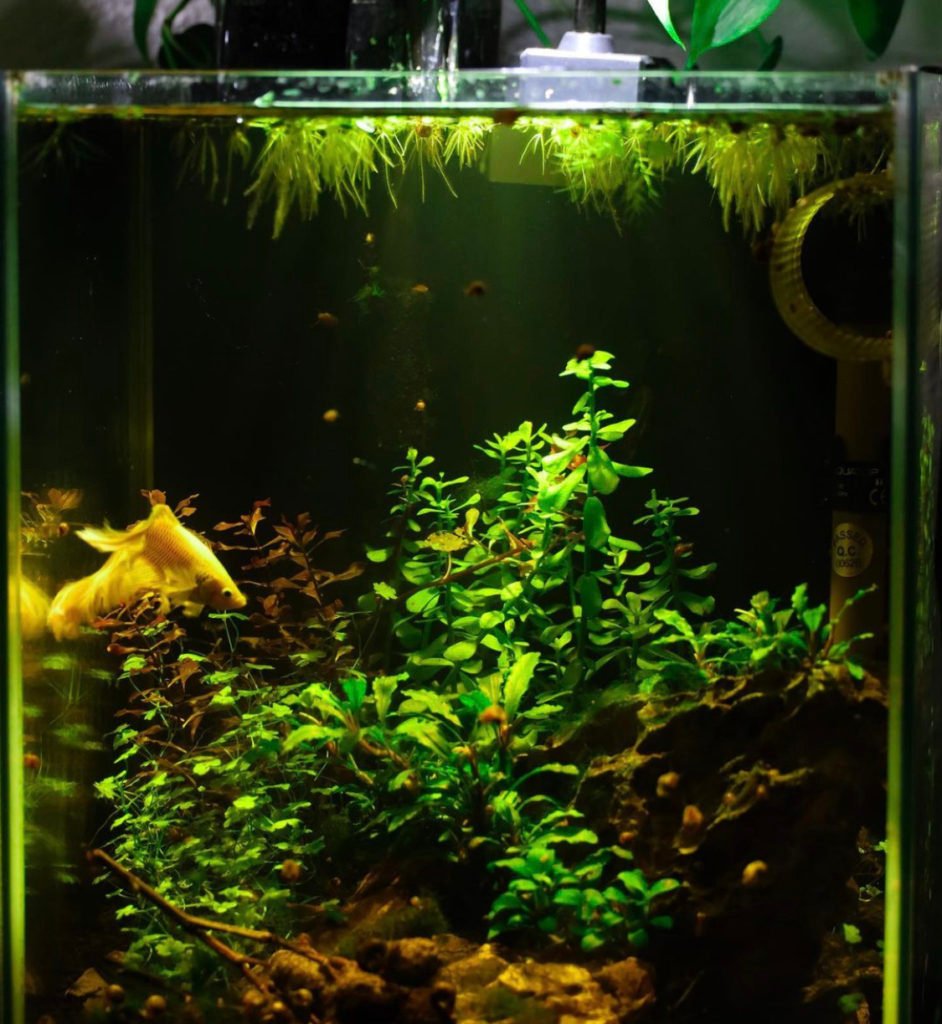
Signs of Stress and Illness in Betta Fish
Recognizing the signs of stress and illness in your betta fish is essential for providing timely care and treatment. Some common indicators include:
- Lethargy: A healthy betta fish should be active and responsive. If your betta is lying on the bottom of the tank or hiding for extended periods, it may be stressed or unwell.
- Loss of appetite: A sudden decrease in appetite can indicate stress or illness. Monitor your betta’s eating habits and consult a veterinarian if you notice any changes.
- Clamped fins: Healthy betta fish will display their fins proudly. Clamped or folded fins can be a sign of stress or illness.
- Color changes: If your betta fish’s color changes by fading or darkening, it may imply that it is stressed, ill, or aging.
- Bloating or swelling: Bloating or swelling in your betta fish can indicate various health issues, including constipation, dropsy, or internal parasites. Consult a veterinarian if you notice any abnormal swelling in your fish.
- Rapid breathing or gasping: If your betta fish is breathing rapidly or gasping at the surface, it may be experiencing respiratory distress. Poor water quality, low oxygen levels, or illness can cause this.
- White spots or patches: White spots or patches on your betta fish can indicate a fungal or parasitic infection, such as ich or velvet. Early detection and treatment are essential for successfully combating these diseases.
Tips for Betta Fish Compatibility
Betta fish are known for their aggressive tendencies but can coexist with other fish species in certain circumstances. Here are some tips for maintaining a harmonious community tank with betta fish:
- Choose compatible tank mates: Some species are more likely to coexist peacefully with betta fish. Look for non-aggressive, fast-swimming fish that won’t compete for food or territory. Good options include corydoras catfish, small rasboras, and peaceful tetras.
- Provide ample space: Overcrowding can exacerbate aggression in betta fish. Ensure that your tank is large enough to accommodate all your fish comfortably. Generally, allow at least one gallon of water per inch of fish.
- Create visual barriers: Including plants, rocks, and other decorations in your tank can create visual barriers that help reduce aggression by breaking up sightlines.
- Monitor behavior: Monitor your betta fish and its tank mates to ensure they get along. If you notice signs of aggression, consider separating the fish or adjusting the tank setup to minimize conflict.
- Avoid similar-looking fish: Betta fish may be more likely to display aggression towards other fish that resemble them in color or shape. Choosing tank mates with different appearances can help reduce the likelihood of conflict.
In conclusion, the best way to clean a betta fish tank involves a combination of regular water changes, proper filtration, the careful maintenance of water parameters, and providing a stimulating environment. Following these guidelines and monitoring your betta fish’s health can ensure your pet thrives in its aquatic home.

Mastering the Art of Dog Training: How to Train Your Dog to Stop Barking
Introduction to Dog Barking Barking is an inherent characteristic

How to Clean Goldendoodle Ears: Preventing Infections
Welcome to our essential guide on how to clean

Top Picks: Best Harness for Goldendoodle Revealed!
Welcome to our comprehensive guide on finding the best

Insider Tips for the Perfect Goldendoodle Diet
Struggling with your Goldendoodle’s diet can be a real

Goldendoodles Grooming: The Ultimate Toolkit for Perfect Care
Table of Contents Welcome to the world of Goldendoodles

Discover the Perfect Dog Nail Grinder for Your Furry Friend
Finding the ideal dog nail grinder can be daunting in the

